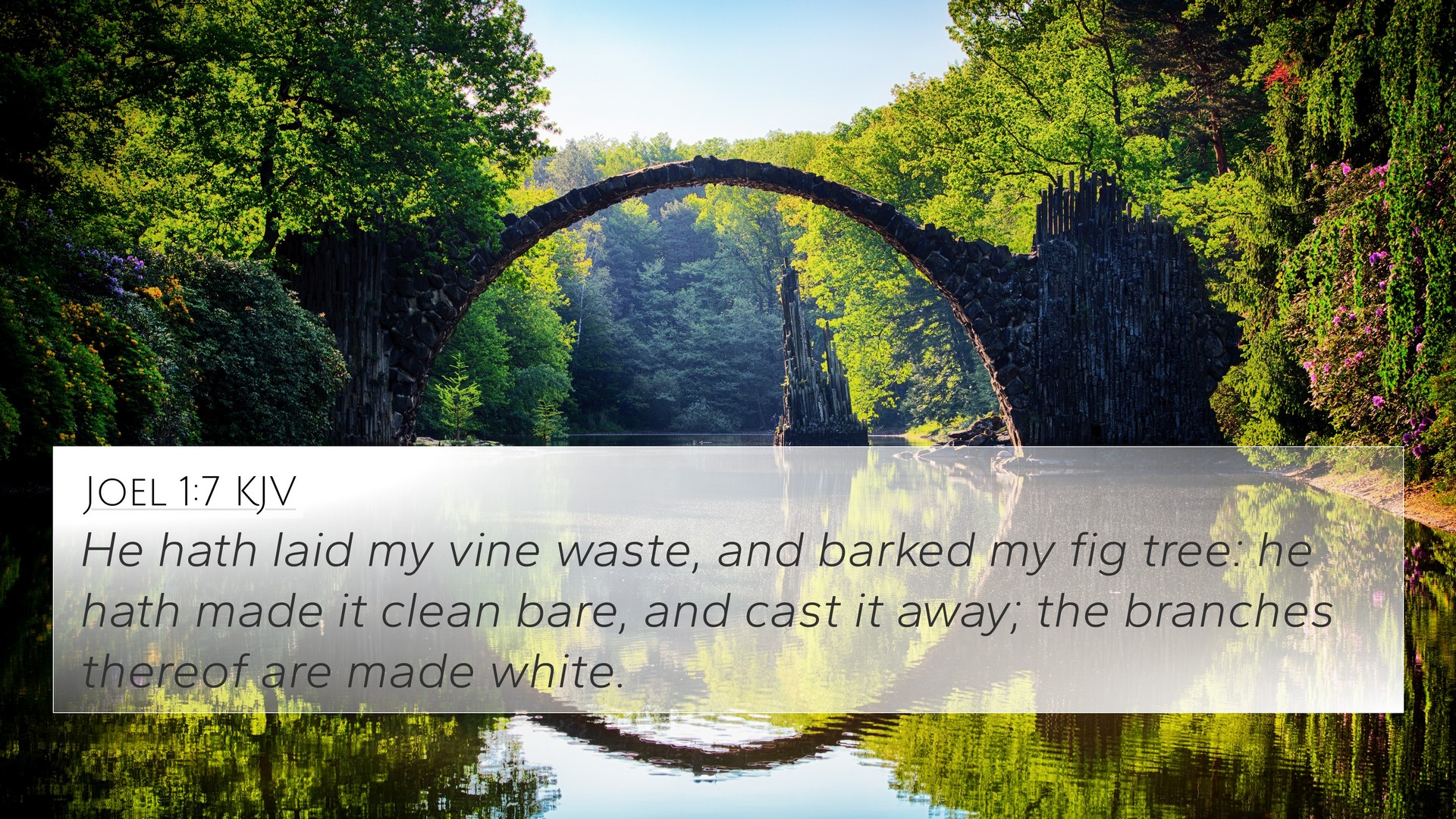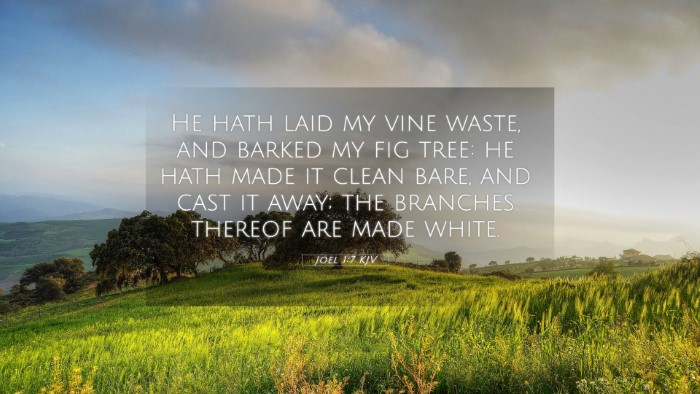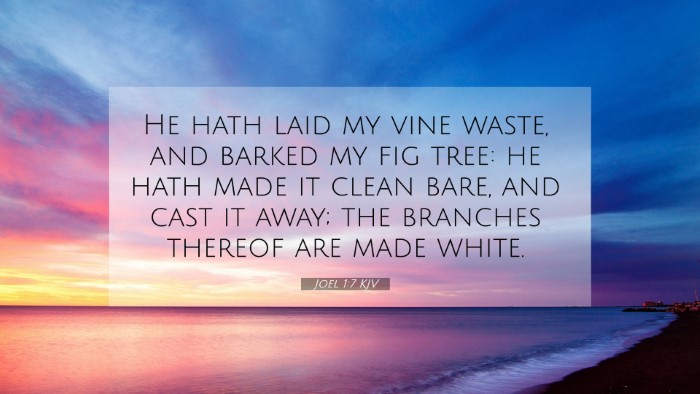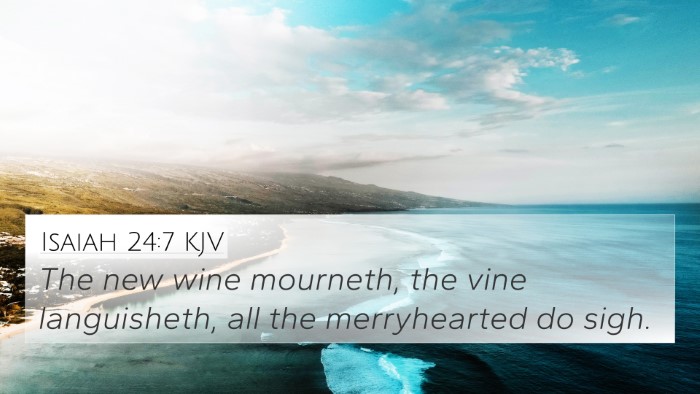Old Testament
Genesis Exodus Leviticus Numbers Deuteronomy Joshua Judges Ruth 1 Samuel 2 Samuel 1 Kings 2 Kings 1 Chronicles 2 Chronicles Ezra Nehemiah Esther Job Psalms Proverbs Ecclesiastes Song of Solomon Isaiah Jeremiah Lamentations Ezekiel Daniel Hosea Joel Amos Obadiah Jonah Micah Nahum Habakkuk Zephaniah Haggai Zechariah MalachiJoel 1:7 Similar Verses
Joel 1:7 Cross References
He hath laid my vine waste, and barked my fig tree: he hath made it clean bare, and cast it away; the branches thereof are made white.
Uncover the Rich Themes and Topics of This Bible Verse
Listed below are the Bible themes associated with Joel 1:7. We invite you to explore each theme to gain deeper insights into the Scriptures.
Joel 1:7 Cross Reference Verses
This section features a detailed cross-reference designed to enrich your understanding of the Scriptures. Below, you will find carefully selected verses that echo the themes and teachings related to Joel 1:7 KJV. Click on any image to explore detailed analyses of related Bible verses and uncover deeper theological insights.
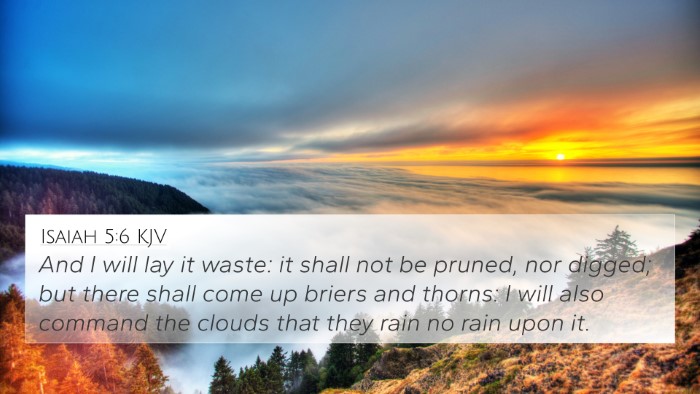
Isaiah 5:6 (KJV) »
And I will lay it waste: it shall not be pruned, nor digged; but there shall come up briers and thorns: I will also command the clouds that they rain no rain upon it.
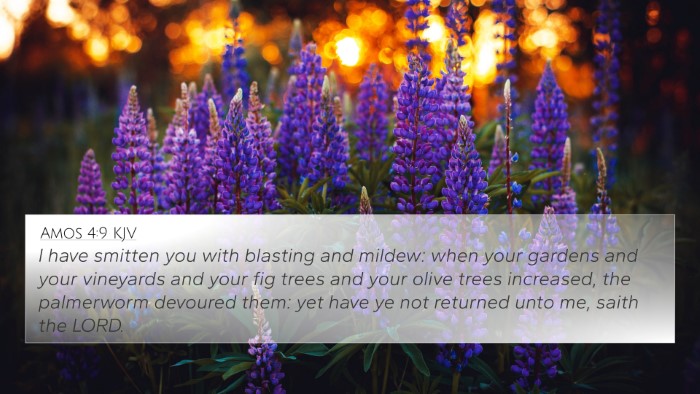
Amos 4:9 (KJV) »
I have smitten you with blasting and mildew: when your gardens and your vineyards and your fig trees and your olive trees increased, the palmerworm devoured them: yet have ye not returned unto me, saith the LORD.
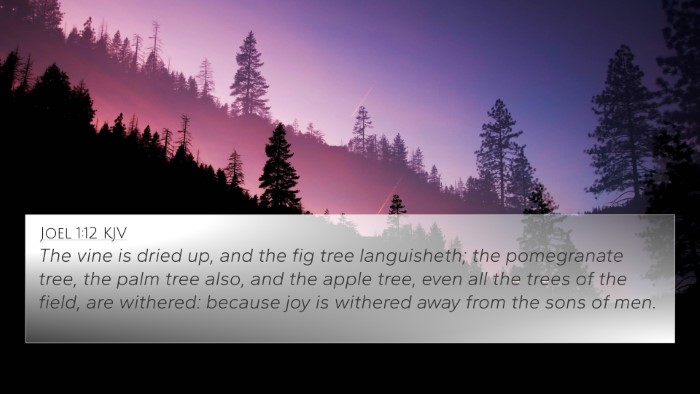
Joel 1:12 (KJV) »
The vine is dried up, and the fig tree languisheth; the pomegranate tree, the palm tree also, and the apple tree, even all the trees of the field, are withered: because joy is withered away from the sons of men.
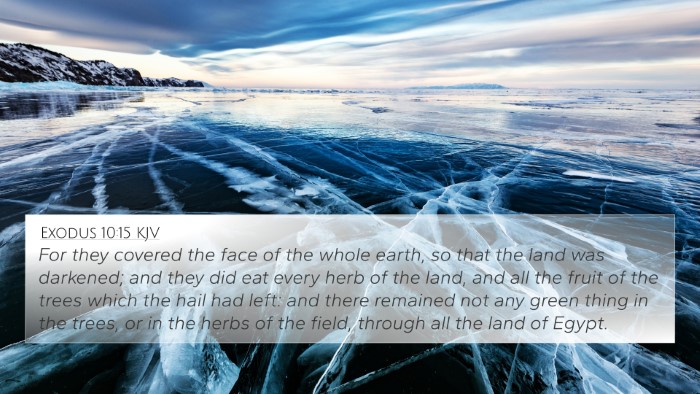
Exodus 10:15 (KJV) »
For they covered the face of the whole earth, so that the land was darkened; and they did eat every herb of the land, and all the fruit of the trees which the hail had left: and there remained not any green thing in the trees, or in the herbs of the field, through all the land of Egypt.
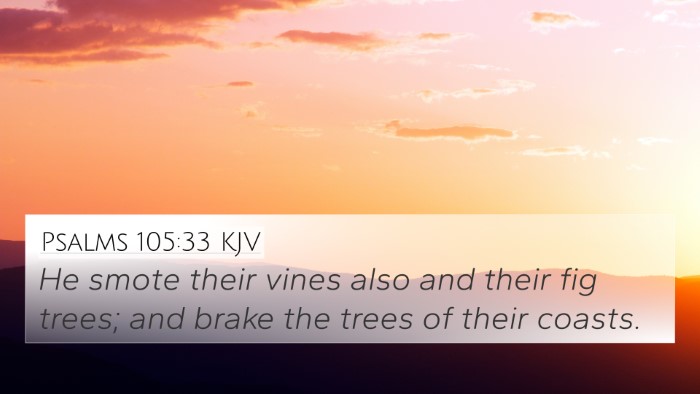
Psalms 105:33 (KJV) »
He smote their vines also and their fig trees; and brake the trees of their coasts.
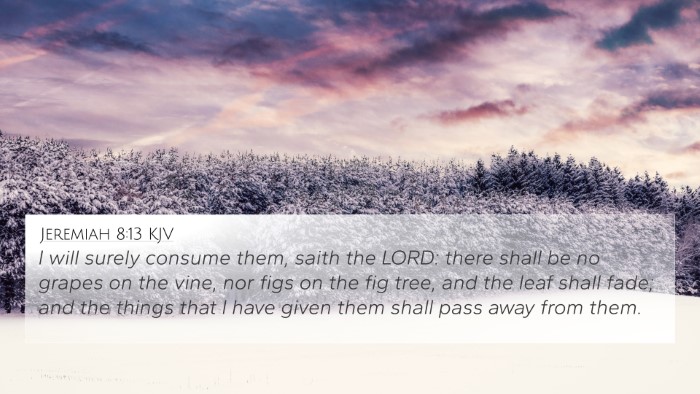
Jeremiah 8:13 (KJV) »
I will surely consume them, saith the LORD: there shall be no grapes on the vine, nor figs on the fig tree, and the leaf shall fade; and the things that I have given them shall pass away from them.
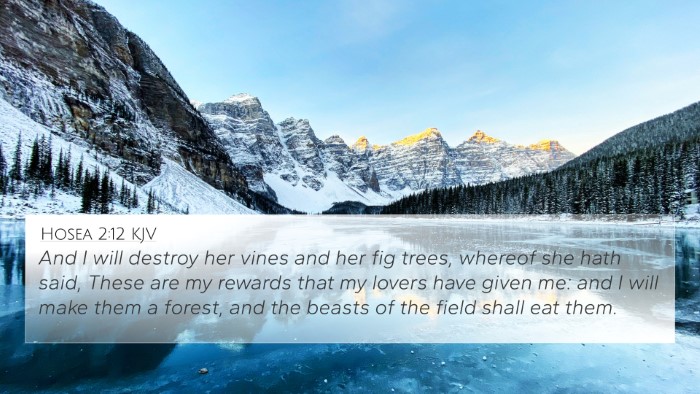
Hosea 2:12 (KJV) »
And I will destroy her vines and her fig trees, whereof she hath said, These are my rewards that my lovers have given me: and I will make them a forest, and the beasts of the field shall eat them.
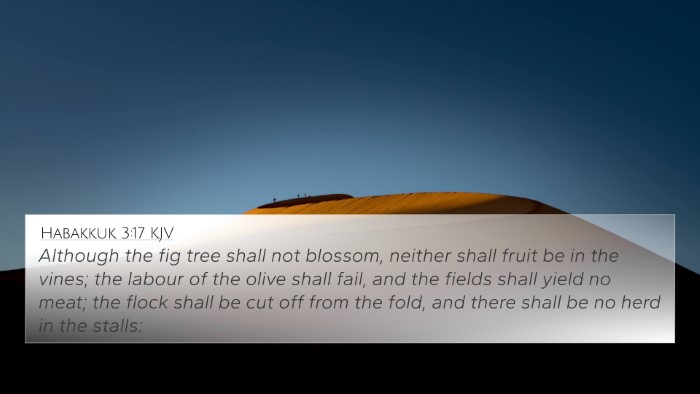
Habakkuk 3:17 (KJV) »
Although the fig tree shall not blossom, neither shall fruit be in the vines; the labour of the olive shall fail, and the fields shall yield no meat; the flock shall be cut off from the fold, and there shall be no herd in the stalls:
Joel 1:7 Verse Analysis and Similar Verses
Understanding Joel 1:7
Joel 1:7 states: "He hath laid my vine waste, and barked my fig tree: he hath made it clean bare, and cast it away; the branches thereof are made white." This verse serves as a vivid metaphor for devastation and loss, primarily focusing on the agricultural destruction which symbolizes deeper spiritual and communal crises in Israel.
Summary of Joel 1:7 Meaning
In examining this verse, we can draw insights from various public domain commentaries:
- Matthew Henry: He reflects on the lament of the prophet over the destruction brought on by locusts, painting a picture of total desolation that not only affects the land but also the people's relationship with God. The vine and fig tree are symbols of God's blessings, and their devastation indicates a severe spiritual decline.
- Albert Barnes: Barnes explains that this passage signifies a complete stripping away of the normal bounties that the people relied upon. He emphasizes that this destruction is both physical and spiritual, urging the people to recognize their dependence on God for sustenance and well-being.
- Adam Clarke: Clarke notes the significant implications of the locust plague as a divine judgment. He stresses the importance of repentance and returning to God, hinting that such natural disasters serve as calls to spiritual renewal.
Contextual Analysis
The context of Joel 1:7 is essential for understanding its full meaning. Joel addresses the devastating consequences of locust swarms that ravaged the land of Judah. This destruction serves as a powerful backdrop for a call to repentance among the people of Israel. The imagery of the vine and fig tree, which were vital elements in Jewish culture, underscores the gravity of the situation.
Cross-References for Joel 1:7
This verse connects with several other Bible verses that share themes of judgment, desolation, and the need for spiritual repentance:
- Amos 4:9: Highlights God’s judgment through agricultural devastation.
- Hosea 9:10: References the produce of the land being taken away due to sin.
- Micah 7:1: Discusses the sorrow over the lost blessings akin to fruitlessness.
- Psalms 80:12: Expresses feelings of abandonment resulting from sin, likening God's people to a vine.
- Isaiah 24:7-10: Portrays the desolation of the earth due to the people's transgressions.
- Jeremiah 5:17: Mentions invasions that lead to the destruction of crops and a call to repentance.
- Luke 13:6-9: Jesus’s parable of the barren fig tree emphasizes the need for fruitfulness and the consequences of barrenness.
Spiritual Implications and Themes
The ramifications of this verse stretch beyond the surface-level historical account of a plague. It reflects broader themes of:
- Divine Judgment: The locust plague as a sign of God's displeasure.
- The Call to Repentance: A consistent theme in the prophetic literature urging a return to God.
- Community and Consequence: The notion that communal sin results in collective punishment and loss.
Tools for Bible Cross-Referencing
To delve deeper into the connections and themes prominent in Joel 1:7 and other biblical texts, there are numerous tools available:
- Bible concordances to locate verses related to themes in Joel.
- Bible cross-reference guides that simplify finding thematic connections.
- Cross-reference Bible study methods that explore the relationships between verses.
- Online resources that provide comprehensive Bible cross-reference materials.
Conclusion
Joel 1:7 serves as a poignant reminder of the consequences of turning away from God and the resulting desolation in both the physical and spiritual realms. By cross-referencing this verse with others, believers can gain insights into the interconnectedness of scripture, the necessity for repentance, and the hope found in returning to God's grace.
